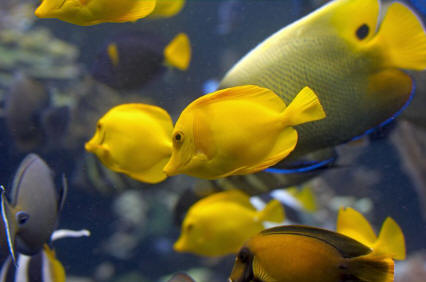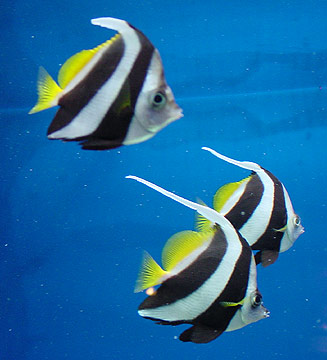Keyhole Cichlid

|
Scientific Name: Cleithracara maronii Price: Upon Request Origin: South America Family: Cichlidae NOT AVAILABLE NOW |
|
Other Names: Acara maronii, Keyhole Acaras, Keyholes |
|
Technical Info
Temperature: 22 - 25 ℃
pH: 6.8 - 7.5
GH: 9 - 20
Max size: 10 cm
Min Tank size: 100 Ltr
Position in Aqua: No special swimming level
Description
The keyhole cichlid isnít very colourful but are still a beautiful addition to any aquarium due to its distinct pattern. The body is a yellow cream colour but turns more towards brown if the fish is stressed. There is a black spot in the middle of the body which looks like a keyhole and is what gives this fish its name. The spot doesnít always look like a keyhole, in some specimens it simply looks as a black dot. This black dot can turn into a band across the fish when the fish is stressed. The colour of the fins can vary between different populations and can be everything from soft yellow to neon blue. Most populations have some blue in their fins but not all. Their bodies are oval shaped and rounder than many other cichlids.
Food
It will accept the majority of prepared foods, though a varied diet containing both quality dried products plus live or frozen bloodworm, Artemia, Daphnia, etc. should be offered for the fish to develop optimal condition.
Breeding
It is difficult to distinguish between male and female Keyhole Cichlids. Males are generally larger than females and boast longer anal fins. Once paired, Keyhole Cichlids form nuclear families. Breeding often results in up to 300 eggs placed on carefully cleaned, flat rocks. Once spawned, both the male and female will protect and fan the eggs to stave off any predators and keep water circulating.
Compatible with
Keyhole cichlids are not really an aggressive fish and will get along well with ot her cichlids of the same temperament, such as Green or Gold Severums and Rivulatus.
Note
Juveniles are impossible to sex accurately by external means but adult males grow considerably larger than females and develop extended dorsal and anal fins.

